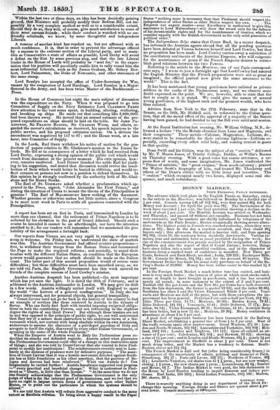A report has been set on foot in Paris, and
transmitted to London by more than one channel, that the retirement of Prince Napoleon is to be softened by his elevation to-the post of Grand Admiral. Should such a course be intended it cannot be an afterthought, nor have the intention ascribed to it ; for our readers will remember that we mentioned the pro- bability of the arrangement a fortnight hack.
Our reports from Vienna are not very rapid in coming, so that every scrap is welcome. On Friday last., we understand the state of matters was this. The Austrian Government had offered ceunter-propositions- first, to withdraw their troops from the Roman States and recommend the Pope to make the required reforms ; and secondly, to annul their treaties with the different Italian States, on condition that the European powers would guarantee that no attack should be made on the Italian coast. The latter part of this second proposition would of course raise difficulties ; but these difficulties must have been smoothed away, as, we are told via Paris, the English Government has this week assured its friends of the complete success of Lord Cowley's mission.
Another Austrian despatch has been published—the most important which has yet seen the light. It is dated the 20th of February, and is addressed to the Austrian Ambassador in London. We may give its drift in a few words. Austria willingly united itself with England to spare the world "the horrors of a general conflagration." In Italy she has always intervened, not for personal objects, but general tranquillity.
"Count Cavour need not go far back in the history of his country to find an example of services like these rendered by Austria to the dynasty of
Savoy. Who can fairly find fault with treaties imposing reciprocal obhga- dons on both the contracting Powers, and not influencing in the slightest
degree the rights of any third Power ? But although these treaties are not in any way opposed to the principle of public right, we can well understand that they are of a nature most obstructive to the ambitious views of a Ga vernment which, not content with being absolute within its own dominions, endeavours to assume the character of a privileged guardian of Italy and arrogate to itself the right, disavowed by every other Italian Government, of speaking in the name of the whole Peninsula."
When the Emperor of Austria went to Italy the Piedmontese press re- doubled its attacks and defended regicide. Austria asked what guarantee the Piedmontese Government could offer of a change in this destructive state of things ; and she was told by Count Cavour that she wanted to force Pied. mont to modify her institutions ! The reinforcements recently sent to Lom- bardy at the dictates of prudence were for defensive purposes. "The asser- tion of Count Cavour that it was a hostile movement directed against Sardi- nia has as little foundation as his other assertion, that the garrison of Bo- logna and Ancona had been reinforced." What can Austria do ? Can longaniinity be carried further ? Austria has always supported real progress —" every practical and beneficial change." What is understood in Pied- mont as "liberty, is little else than license." "At the same time we do not less frankly acknowledge that the Piedmontese Government is the only judge of what is for the internal good of its dominions, and we feel that we have no right to impose certain forms of government upon other Italian States, or to point out the particulars in which the system. should be altered."
We are told that Austria will refrain from aggressive conduct to the same extent as Sardinia refrains. To bring about a happy result in the Papal States "nothing more is necessary than that Piedmont should respect the independence of other States as other States respect her own The Emperor our august master—your Excellency is authorised to give this assurance to Lord Malmesbury—will draw the sword only for the defence of his incontestable rights and for the maintenance of treaties, which we consider equally with the British Government as the only solid guarantee of political order."
The Inetipeudanee Beige states that Count Buol, in a recent despatch, has informed the Austrian agents abroad that all the pending questions have been debated at Vienna between himself and Lord Cowley, but that no proposition has been made. Lord Cowley carries away a conviction of the conciliatory sentiments of the Austrian Emperor, who will cooperate for the maintenance of peace if the French Emperor desires to reesta- blish good relations between the two Powers. Referring to the article in the Illostiteur, one of our Paris correspond-. ants says, "I wrote to you a fortnight ago that Lord Cowley had assured the English Ministry that the French preparations were not so great as imagined ; the official journal now gives the same assurance to the world." This is the fact.
It has been mentioned that young gentlemen have enlisted as private soldiers in the ranks of the Piedmontese army, and we observe some doubt expressed on the point. We are, however, able to state that the fact is simply as it is stated. We could give the names of several young gentlemen, of the highest rank and the greatest wealth, who have thus enlisted.
Advices from New York to the 27th February, state that in the Senate, on the 26th, Mr. Sliddell said, in reference to the Cuban ques- tion, that all the moral effect of the approval of a majority of the Senate having been gained, he had decided to lay the Bill over until next session.


























 Previous page
Previous page